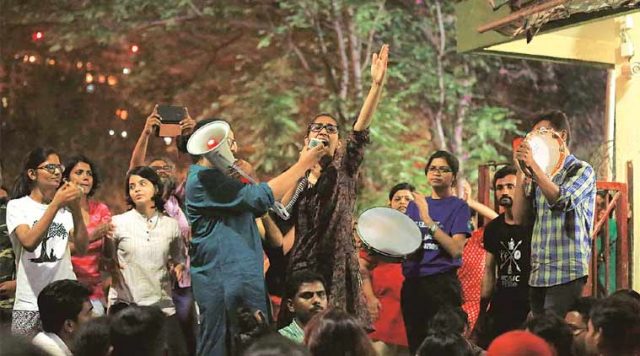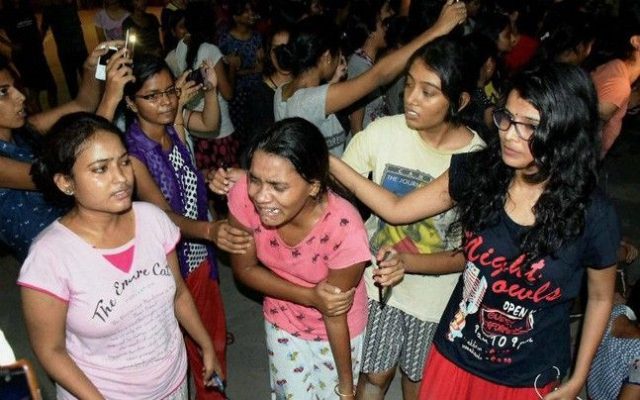A university is not just meant to be a place to study and earn a degree, it is supposed to be a breeding ground of new ideologies and ways of thinking- an atmosphere to shape young minds.
However, a debate that has been raging over the past few years is whether or not it is necessary for Indian universities to encourage a politically active environment on campus.
Politically Active Campuses in India
Universities like Delhi University, Jawaharlal Nehru University, University of Hyderabad (also known as Hyderabad Central University), and Tata Institute of Social Sciences (TISS) are well known campuses that give students a great deal of autonomy in terms of forming their own political leanings. Political parties have also been known to have student wings on these campuses.
TISS Protests
Starting February 21, the students of all 4 TISS campuses (Mumbai, Hyderabad, Guwahati, and Tuljapur) have been on bandh in protest against the administration’s decision to withdraw monetary support being given to students belonging to the SC/ST and OBC categories, who are otherwise eligible for the Government of India Post-Matric Scholarship (GoI-PMS).
Fahad Ahmed, the general secretary of the TISS Students’ Union, was quoted by The Hindu saying that, “It is our right to get the scholarship, and until all our demands are fulfilled, we’re not calling off the strike. Our fight is not just against the TISS administration, but this government as well. Prime Minister Narendra Modi played the OBC card in the last elections, but his policies are excluding students from marginalised sections from education.”

BHU Protests
In September 2017, there was an alleged eve-teasing incident on the Benares Hindu University (BHU) campus, against which several girl students rose in protest. However, the protests turned violent when the police began to administer lathi charge to the girl students.
Alleged outsiders also joined and began pelting stones. PM Modi had “spoken” to Uttar Pradesh CM Yogi Adityanath, who was subsequently “conducting a probe.”

Read More: TISS’ Gender Neutral Hostel: Here’s Everything You Need To Know
Opposing Political Activity on Campuses
However, there are other campuses in the country (most notably institutions supported by religious trusts and even a few central universities) that oppose political leanings on campus, stating that students go to college to study, and that political activities will be detrimental to this, and that large-scale protests can even lead to the disruption of classes.
Some universities have even been known to bar students who took part in protests (even if they went to other campuses to protest) from writing the semester examinations.
This brings us to the question- is political activity in Indian universities a good thing or not?
Freedom of Choice is Very Important
Firstly, it is important to remember that there are several students who are not sure about their political preferences as yet, and who go to university with the simple aim of studying. Therefore, it would be unfair to judge them for not being politically opinionated, as how it happens in JNU, according to some of my friends who study there.
Having said that, it is also completely unfair to go the other extreme, and ban students from expressing any political affiliations whatsoever, and punish them for doing so.
After all, every campus is a representation of students from all over India, from various socio-economic backgrounds, and all of them have the right to voice their opinions on the current political scenario in the country.
To threaten them with suspension or expulsion for doing so would be curtailing their right to expression and right to freedom of speech, as everyone is entitled to their own opinions.
Students Today, Citizens Tomorrow
The student body of any campus is going to go on to become working citizens of the country tomorrow, and therefore, their political stances do count.
The more aware and vocal they are about the country’s political climate as students, the more conscious they will be of the same as working citizens. And a politically aware citizen is one who is up to date on his or her rights, and one who is less likely to get exploited.
Student protests are also not a negative thing, as long as the protests are nonviolent. If the students are not happy with the functioning of their university (read: the recent TISS protests), they have every right to speak up and express their dissent.
It is important that these nonviolent protests are received with an open mind, and that the students are not manhandled or beaten up for demanding their rights (read: BHU protests).
Live and Let Live
It is my opinion that campuses must have a live and let live attitude. Students must not be treated like children who must only keep their heads down and study, and not think of anything outside their academics.
At the same time, “being political” must be a CHOICE- if a student feels that they do not want to affiliate themselves to a political ideology for any particular reason, they must never be judged for holding back.
Image Credits: Google Images
Sources: The Hindu, India Today, Financial Express
More Recommendations:
http://edtimes.in/2018/04/delhi-metro-time-for-some-relief-for-the-students-and-the-elderly/




























